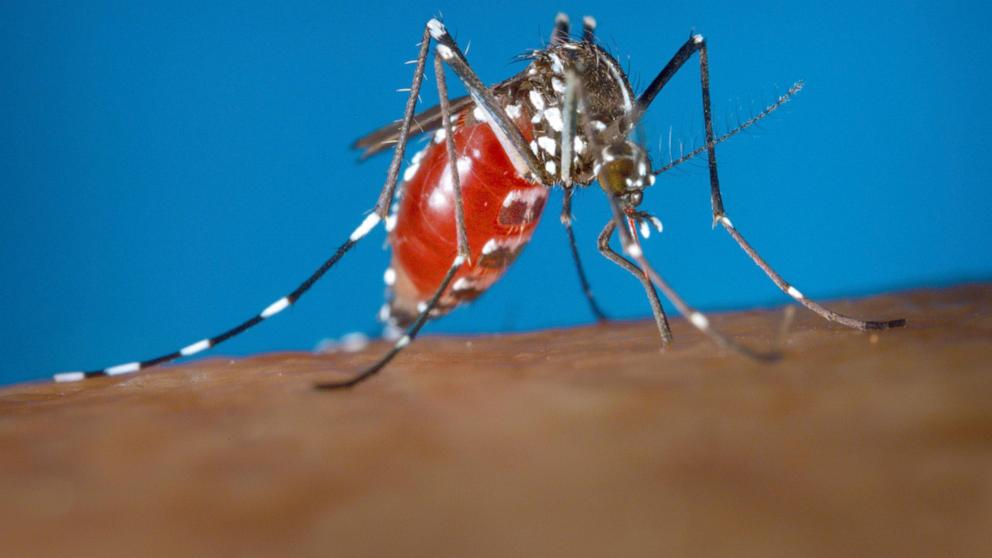NEW YORK — U.S. health officials on Tuesday warned doctors to be on the lookout for cases of dengue fever as the tropical disease breaks international records.
The mosquito-spread virus is exploding around the world, driven in part by climate change: In just six months, countries in the Americas have already broken annual records for dengue cases.
The World Health Organization declared a state of emergency in December, and Puerto Rico declared a public health emergency in March.
Dengue fever is still not very common in the continental U.S., but three times as many cases have been reported in all 50 states so far this year compared with the same period last year. Most of the cases are from international travelers, and officials have warned that while there's no evidence of an ongoing epidemic, local mosquitoes pose a threat.
In a health alert on Tuesday, the Centers for Disease Control and Prevention (CDC) advised doctors to monitor symptoms, ask about where patients have traveled recently and consider ordering dengue testing when appropriate.
Dengue fever (pronounced “den-gu”) is caused by a virus transmitted by a type of mosquito that lives in warm climates, and experts say its range is expanding due to climate change.
While many infected people do not become ill, some experience headaches, fever and flu-like symptoms. In severe cases, it can lead to severe bleeding, shock and death.
Repeated infections are especially dangerous.
There are four types of dengue virus, designated 1, 2, 3, and 4. After a person is infected for the first time, their body makes antibodies against that type for the rest of their life. If they become infected with another type of dengue virus, the antibodies from the first infection may not be able to neutralize the second type, and may help the virus enter and replicate in immune cells.
This is a concern for Puerto Rico, which has experienced widespread exposure to type 1 of the virus over the past two decades, and last month the island reported its first dengue death this year.
“We are currently seeing an increase in dengue 2 and dengue 3 cases, and the population has very low immunity,” said Dr. Gabriela Paz Bailey, Puerto Rico-based chief of the CDC's dengue division.
There are no widely available drugs to treat dengue infection.
Vaccines are tricky. In 2021, U.S. officials recommended just one, made by Sanofi Pasteur. The three-dose vaccine is designed to protect against all four strains of dengue and is only recommended for children ages 9 to 16 who have had dengue before and live in areas where dengue is endemic, such as Puerto Rico.
These limitations and other issues mean the vaccine isn't widely used: As of late last month, only about 140 children in Puerto Rico had been vaccinated since it became available in 2022, and Sanofi Pasteur told the CDC it would stop producing the vaccine.
Another vaccine, made by Tokyo-based pharmaceutical company Takeda Pharmaceutical Co., is not currently authorized in the U.S. Other vaccines are in development.
More than 6.6 million cases were reported in about 80 countries around the world last year. In the first four months of this year, 7.9 million cases and 4,000 deaths were reported, according to the World Health Organization. The Americas, including Brazil and Peru, have been hit particularly hard.
In the United States, the number of cases is much lower, about 3,000 in U.S. states and territories last year, but it is the worst in a decade and there has been an increase in localized transmission by native mosquitoes, most of which have been in Puerto Rico, but about 180 cases have been in three U.S. states, Florida, Texas and California.
So far this year, there have been nearly 1,500 cases in the United States, nearly all of them in Puerto Rico.
Most cases on U.S. soil are still in people who became infected while traveling internationally.
It's a “traveler's nightmare” and is raising international concern, said Dr. Lulu Bravo, who studies pediatric tropical diseases at the University of the Philippines Manila and has worked with Takeda on the vaccine.
“If the virus spreads in one country, tourists may stop coming,” Bravo said.
___
The Associated Press Health and Science Department receives support from the Howard Hughes Medical Institute's Science Education Media Group. The AP is solely responsible for all content.



